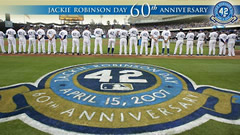The Leadership of Jackie Robinson: Number 42
Jackie Robinson: An Enduring Icon of Leadership

Jackie Robinson's life exemplifies courage, character and conviction. Jackie was athletically gifted with a rare ability to thrill the fans of baseball. But his talents went much deeper than hitting, running, catching and throwing. The prejudice and abuse Robinson endured as Major League Baseball's first African American player paved the way for black athletes who followed him and brought national attention to segregation and injustice towards black Americans.
Despite the many obstacles he had to overcome, Jackie Robinson had an outstanding baseball career which earned him honor as a member of the National Baseball Hall of Fame. And if there should ever be an American Leadership Hall of Fame, Jackie Robinson's plaque should proudly hang there as an exemplary model of leadership.
[Reprinted from the www.jackierobinson.org]
In 1957, Robinson became the Vice President of Chock Full O' Nuts, a coffee and restaurant chain. He later co-founded Freedom National Bank of Harlem, where he was Chairman of the Board from 1964 to 1972. In 1970, he organized the Jackie Robinson Construction Corporation. In both banking and construction his major aim was to contribute to the improvement of living conditions for Black Americans, especially in the major metropolitan areas. At the same time, Jackie Robinson was also deeply concerned with the struggle for civil rights. Starting in 1957, he traveled extensively to raise funds for the NAACP. These efforts led to close relationships with Dr. Martin Luther King, Jr. and other prominent leaders. He was also a staunch supporter of the Anti-Defamation League of B'nai Brith. His concern with politics led him to influence leaders such as Presidents Eisenhower, Kennedy and Nixon; Hubert Humphrey and Nelson Rockefeller. In 1964, he resigned from Chock Full O' Nuts to work full time on the campaign of Governor Rockefeller, who later appointed him as Special Assistant of Community Affairs. In 1968, he campaigned on behalf of Vice President Hubert Humphrey in his presidential bid. Jackie Robinson worked tirelessly over the years with a variety of church groups and community organizations. He served on the Board of Managers of the Harlem YMCA, where a building now bears his name. A major supporter of the National Conference of Christians and Jews, he served as National Chairman of its Brotherhood Week in 1968.  Highlights of his baseball career include:
Highlights of his baseball career include:
Robinson's history-making achievements in baseball were only part of his extraordinary life and legacy. He made his gift for the game into a forum for all of America to engage in a conversation that would leave a lasting impact on almost every facet of our society. His outspoken leadership on issues of civil and human rights continued throughout his years as a corporate executive, civil servant, and major figure in national politics.
"The right of every American to first-class citizenship is the most important issue of our time." -- Jackie RobinsonREAD MORE
| Major League Baseball Jackie Robinson Remembered | Click here to visit site |
| National Baseball Hall of Fame | Click here to visit site |
| The Jackie Robinson Foundation | Click here to visit site |
Labels: Character, Civil Rights, Diversity, Icon of Leadership, Leadership




0 Comments:
Post a Comment
<< Home